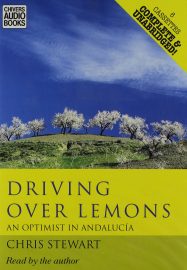Everyone has grappled with this question in some form or another – what makes us happy? This one is formidable there are no clear-cut answers. What’s paradise for one person can be hell for another and vice versa. At the same time, it can be interesting and illuminating to read about someone’s journey to fulfilling what they set out to do.
Enter Chris Stewart. Chris was a drummer and one of the founding members of the English rock band Genesis, along with Peter Gabriel and Tony Banks. Chris’ career as a drummer was short lived. After he left Genesis, he did something completely unpredictable. With all the savings that he had, he bought a farm named El Valero in Las Alpujarras region of Andalucia, Spain. He moved there with his wife Ana and has been living there ever since. Chris is also a sheep shearer. This helped him financially while surviving in Andalucia. Driving Over Lemons – the subtitle is An Optimist in Andalucia – is the autobiographical account of Chris’ adventures in everything from farming and building houses to pig killing and becoming a proper shepherd. Chris has a somewhat romantic vision of the last one – the shepherd taking his sheep up the hill, watching them graze on lush green grass through wet mist.
Chris, or Cristóbal, as he is known in the Spanish community, had to learn everything. Fortunately, experienced farmers like his neighbour Domingo, were there to help. Perhaps the toughest two tasks were building a house in stone and building a bridge over the nearby river. In the first one, Domingo showed Chris how to place each stone one over the other and then cement the whole thing. Within a week or two, Chris gained enough knowledge so that later he led a team of volunteers from New Zealand to finish building the house. Second task was more difficult. You have to cut large beams of eucalyptus tree trunks, put large stones in the river and build a pier, and finally haul the beams on top. It took twelve strong men four hours of hard work to get everything in place.
There were some failures as well. The poultry project, consisting of chickens, guinea-fowls, ducks, pigeons and quails started off promisingly but ultimately failed. Reason? Too many predators, too little protection. Foxes, snakes, stouts, weasels, martens, wild cats, rats, all lying in wait for their next meal. Speaking of meals, the book also has an interesting recipe of papas a lo pobre – ‘poor man’s potatoes’.
The tendency to idealize living in nature can be very tempting. Even Chris has an ideal picture in his mind in the beginning, but he is honest in recording the gaps between the ideal and the practical. Not everything is hunky-dory, problems come in all shapes and sizes, be it a severe drought followed by flood (and the bridge that took so much work was washed away) or preventing the sheep from ransacking the vegetable patch.
“Getting away from it all” has become such a cliché that every week you see a few articles on it. Driving Over Lemons is not about this. There is no message here, it’s just an honest account of an honest journey. Not everyone can be a farmer and live in the woods. What’s fascinating is the whole spectrum of milieus that life has to offer. On the one hand we have state-of-the-art technology with GenAI and on the other we have Chris and Ana, treating sheep wounds using herbal medicines. (It worked!) Mind you, Chris is not anti-technology at all. He was the first one to use a machine for shearing sheep, in the face of strong resistance from the Spanish shepherds who liked the conventional way of doing things.
I found Driving Over Lemons through sheer serendipity – a book sale. (Pick any book for 50 bucks! Hurry!!!) Soon after I discovered the joys of Kindle and ebooks, I happily gave away about a hundred hardcovers and paperbacks. For some reason, I could not part with my copy of Driving Over Lemons. Perhaps, there is some connection between the simple life depicted in the book and reading it in a conventional mode, turning pages.
What is the meaning of the title Driving Over Lemons? We find the answer on page 2. Chris is driving with Georgina, a real estate agent, to look at the farms up for sale. The road is filled with lemons fallen from trees lining up both sides of the road. Chris says,
I stopped and backed up a bit to go round a lemon.
‘Drive over lemons,’ ordered Georgina.



